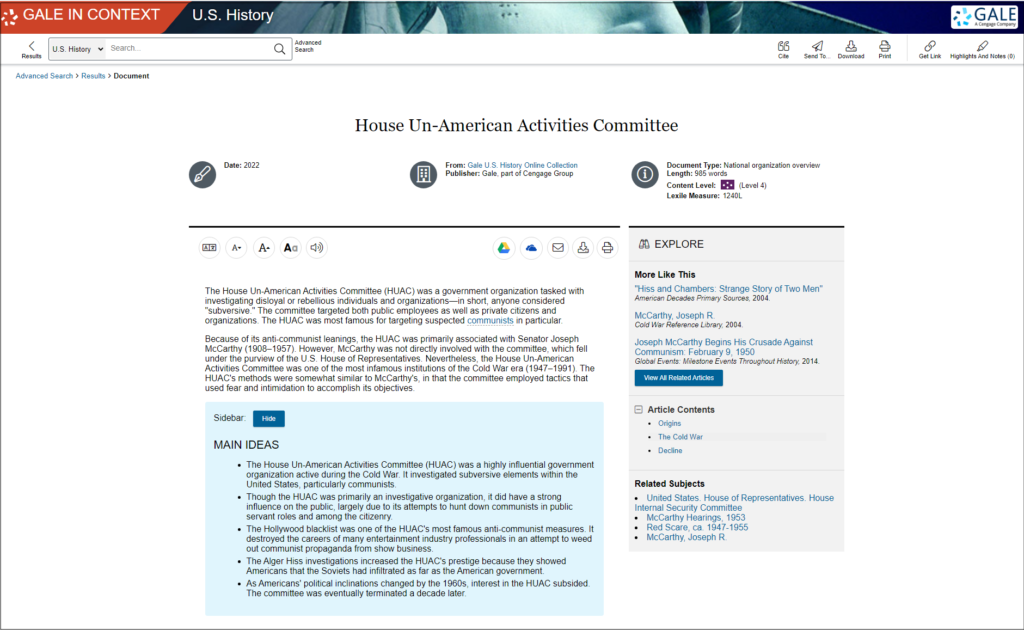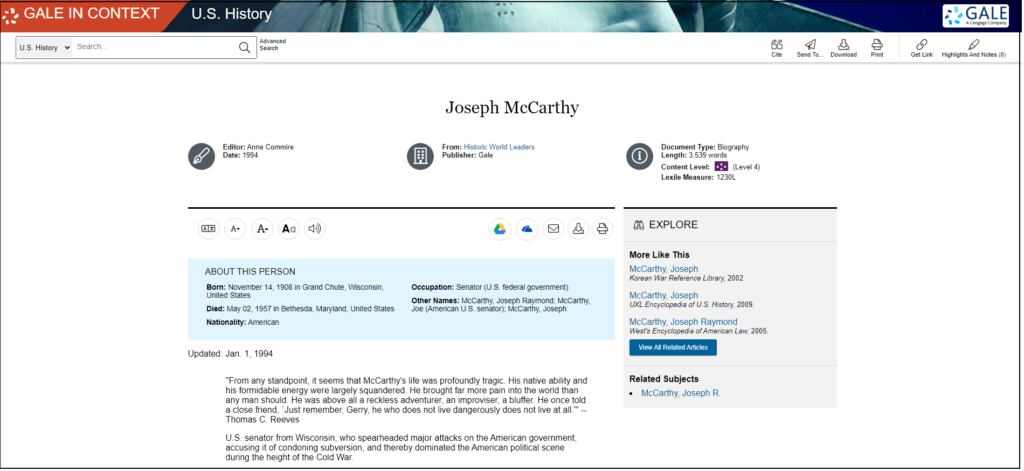| By J. Robert Parks |
In the fall of 1947, various Hollywood artists, including actors, writers, directors, and producers, were subpoenaed by the House Un-American Activities Committee (HUAC) to testify about the supposed communist influence in Hollywood. Ten of those, now known as the Hollywood Ten, refused to cooperate, claiming their First Amendment rights. Seventy five years ago this week (on November 24, 1947), Congress cited them for contempt. Gale In Context: U.S. History has a wealth of resources for teachers and librarians looking to help students understand different concepts, such as the “Red Scare” and blacklisting―as well as why, in this period of time, so many people believed that communism, and particularly communism in Hollywood, was such a threat.
As the divide between the United States and the Soviet Union deepened in the years after World War II, a new Red Scare took hold in the country. People worried that Communist Party members had infiltrated numerous parts of U.S. society and were coordinating with the Soviet Union to undermine the United States. HUAC became a permanent committee in 1945, and one of its earliest activities was an investigation of supposed communist influence in Hollywood. Different Hollywood figures were brought before the committee to admit whether they were or had been a member of the Communist Party, and to name others they knew or suspected of being communists.
This emphasis on naming names, of incriminating others they knew and worked with, was particularly insidious. Anyone who refused to name someone else was suspected of being a communist. Fearing a public backlash, Hollywood studios moved quickly to blacklist the Hollywood Ten, forbidding any studio to give them work. The fact that studios had publicly blacklisted the Hollywood Ten added even more pressure on others to cooperate with the committee.
The investigation into Hollywood and the blacklist emboldened HUAC, and the importance of uncovering suspected communists became a rallying cry. A previously little-known U.S. senator from Wisconsin, Joseph McCarthy, made himself a national figure in the early 1950s when he conducted congressional hearings into whether there were subversive elements in U.S. culture, the government, and even the military. He claimed to have a list of State Department employees who were members of the American Communist Party, and he smeared anyone who tried to stand up to him. The very accusation of being a communist could ruin a person’s career, as the Hollywood Ten had discovered. It was only when the Army-McCarthy hearings were nationally televised in 1954 that the spell of McCarthyism was broken.
As for the Hollywood Ten, they were found guilty of contempt and were each sentenced to one year in jail. After that, some of them moved to Europe to work, but many of the writers stayed in Hollywood and wrote screenplays under a different name. In fact, blacklisted Dalton Trumbo won an Oscar in 1957 for The Brave One, which he had written under the pseudonym Robert Rich. Director Edward Dmytryk later recanted and cooperated with the committee, naming people he suspected of being a communist.
The blacklist faded by the end of the 1950s, and many of the Hollywood Ten returned to Hollywood to work publicly. They were hailed as heroes by many for their resistance, and their body of work includes some of the most-acclaimed movies of the mid-twentieth century. Still, the blacklist had a profound effect on Hollywood, including the kinds of movies it made, and the bitterness over those who named names extended deep into the twentieth century.
Some readers may find it odd that the Hollywood Ten claimed their First Amendment rights in refusing to testify rather than their Fifth Amendment rights. Not everyone agrees that their approach was the correct legal approach, and teachers may find this historical example to be an interesting way of framing a classroom discussion regarding the Bill of Rights.
Not a Gale In Context: U.S. History subscriber and want to know how you can offer you students rich, authoritative content as seen above?
About the Author
J. Robert Parks is a former professor and frequent contributor to Gale InContext: U.S. History and Gale In Context: World History who enjoys thinking about how our understanding of history affects and reflects contemporary culture.





